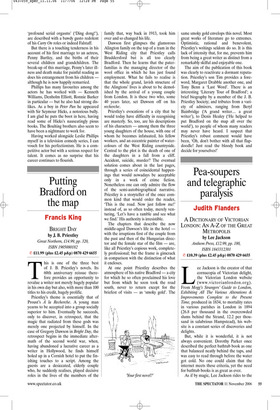Putting Bradford on the map
Francis King
BRIGHT DAY by J. B. Priestley Great Northern, ┬Ż14.99, pp. 320, ISBN 1905080182 Ō£å ┬Ż11.99 (plus ┬Ż2.45 p&p) 0870 429 6655 This is one of the three best of J. B. PriestleyŌĆÖs novels. Its 60th anniversary reissue therefore provides an opportunity to revalue a writer not merely hugely popular in his own day but also, with more than 100 titles to his credit, hugely prolific.
PriestleyŌĆÖs theme is essentially that of ProustŌĆÖs ├Ć la Recherche. A young man yearns to be accepted into a group socially superior to him. Eventually he succeeds, only to discover, in retrospect, that the magic that radiated from these gods was merely one projected by himself. In the case of Gregory Dawson in Bright Day, the retrospect begins in the immediate aftermath of the second world war, when, having abandoned a lucrative career as a writer in Hollywood, he finds himself holed up in a Cornish hotel to put the finishing touches to a script. Among the guests are a desiccated, elderly couple who, he suddenly realises, played decisive roles in the lives of the members of the family that, way back in 1913, took him over and so changed his life.
Dawson first glimpses the glamorous Alington family on the top of a tram in the West Riding city that Priestley calls Bruddersford but is all too clearly Bradford. Then he learns that the paterfamilias is the managing director of the wool office in which he has just found employment. What he fails to realise is that the whole grand, lavish structure of the AlingtonsŌĆÖ lives is about to be demolished by the arrival of a young couple from London. It is these two who, some 40 years later, set Dawson off on his recherche.
PriestleyŌĆÖs evocations of a city that he would today have difficulty in recognising are masterly. So, too, are his descriptions of his characters ŌĆö among them the three young daughters of the house, with one of whom he becomes infatuated, his fellow workers, and an eccentric painter of watercolours of the West Riding countryside. Central to the plot is the death of one of the daughters in a fall from a cliff. Accident, suicide, murder? The eventual solution comes about in the last pages, through a series of coincidental happenings that would nowadays be acceptable only in a work of crime fiction. Nonetheless one can only admire the flow of the semi-autobiographical narrative. Priestley is a storyteller of the once common kind that would order the reader, ŌĆśThis is the road. Now just follow me!ŌĆÖ instead of, as so often today, merely venturing, ŌĆśLetŌĆÖs have a ramble and see what we find.ŌĆÖ His authority is irresistible.
The chapters that describe the now middle-aged DawsonŌĆÖs life in the hotel with the irruptions first of the couple from the past and then of the Hungarian director and the female star of the film ŌĆö are, like all PriestleyŌĆÖs copious work, completely professional; but the frame is gimcrack in comparison with the distinction of what it encloses.
At one point Priestley describes the atmosphere of his native Bradford ŌĆö a city for which he so often proclaimed his love but from which he soon took the road south, never to return except for the briefest of visits ŌĆö as ŌĆśsmoky goldŌĆÖ. The same smoky gold envelops this novel. Most great works of literature go to extremes. Optimistic, rational and benevolent, PriestleyŌĆÖs writings seldom do so. It is this lack of intensity that, for me, prevents him from being a great writer as distinct from a remarkably skilful and enjoyable one.
The aim of the publication of this book was clearly to reactivate a dormant reputation. PriestleyŌĆÖs son Tim provides a foreword, Margaret Drabble another one, and Tony Benn a ŌĆśLast WordŌĆÖ. There is an interesting ŌĆśLiterary Tour of BradfordŌĆÖ; a brief biography by a member of the J. B. Priestley Society; and tributes from a variety of admirers, ranging from Beryl Bainbridge (ŌĆśA grand writer... a great writerŌĆÖ), to Denis Healey (ŌĆśHe helped to put Bradford on the map all over the worldŌĆÖ), to people of whom many readers may never have heard. I suspect that Priestley's robust comment would have been, ŌĆśOh, don't bother with all that flapdoodle! Just read the bloody book and decide for yourselves!ŌĆÖ


































































































 Previous page
Previous page